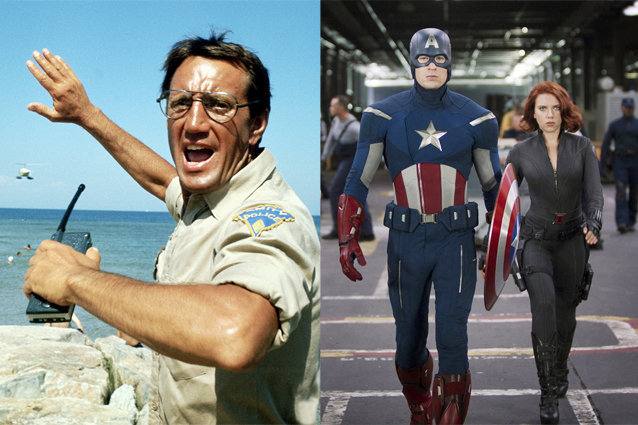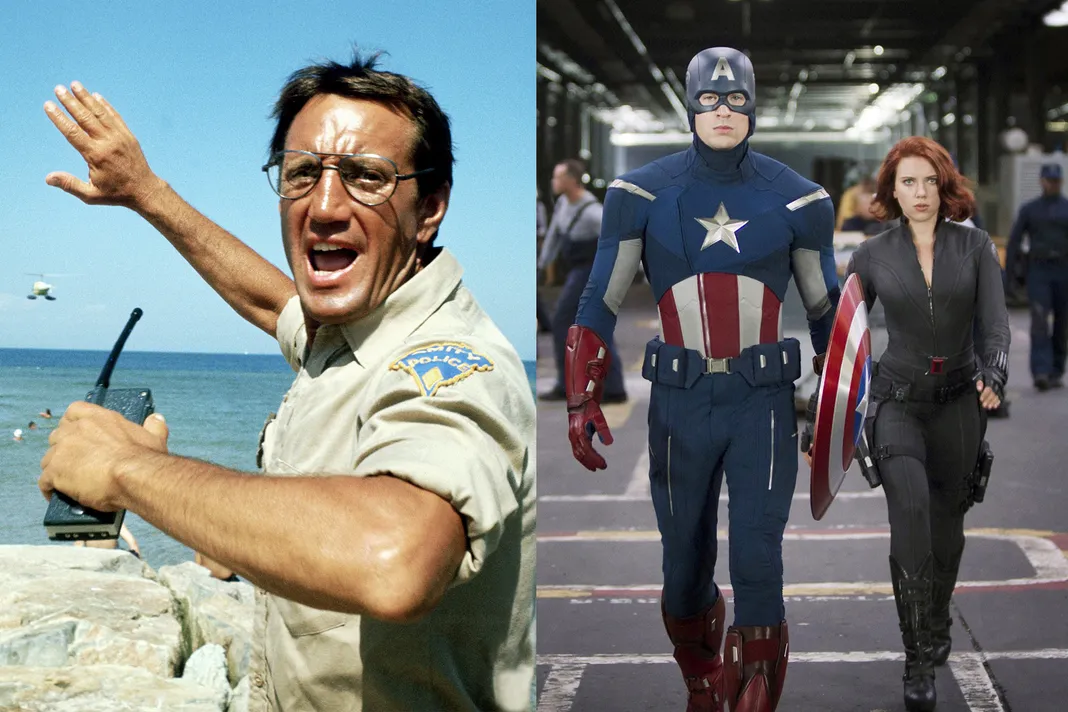 Universal Pictures via Everett Collection/Walt Disney Studios via Everett Collection
Universal Pictures via Everett Collection/Walt Disney Studios via Everett Collection
As Memorial Day approaches, American moviegoers prepare for an onslaught of summer blockbusters. Whether it’s the latest edition of a franchise like X-Men: Days of Future Past or the possible beginning of one like Guardians of the Galaxy, everyone has gotten used to big, expensive films hitting the multiplex when the weather gets warm.
Of course, it wasn’t always that way. The mid ’70s work of Steven Spielberg and George Lucas helped usher in the current model that studios use in setting their summer releases. While the work of the two directors is iconic, what’s followed hasn’t always lived up to the term “blockbuster.” Our writers argue whether things were better in the days when Lucas and Spielberg ruled the roost or if we’re in a new golden age of big budget extravaganzas.
The Spectacular Spielberg (Jon Lisi)
Let’s just assume for a second that Jaws was never released in the summer of 1975.
Cynics might claim that the brilliant New Hollywood films of the 1970s like Five Easy Pieces, Nashville, and The Conversation would continue to be made as a result, but we all know that this so-called “American New Wave” was on the inevitable decline. Instead, we’d have to imagine a cinema in which the first major summer blockbuster from Hollywood was not Spielberg’s terrifying monster movie.
Is it possible to picture the summer blockbuster without Jaws? I don’t think so. For better or worse, Jaws is the gold standard to which all future summer blockbusters have been judged. The question that is asked as a result, then, is whether or not contemporary summer blockbusters like Transformers, Iron Man, The Avengers and other superhero amalgamations compare in quality to past summer blockbusters like Jaws, E.T., Back to the Future, and Ghostbusters?
If we are to answer this question honestly, we need to remove any consideration of money. After all, plenty of movies do well at the box office, and the massive success of the Twilight franchise shows how few of them are actually good. Instead, we need to focus on what the first summer blockbusters like Jaws and Star Wars had that contemporary ones like Transformers and Iron Man lack.
The most significance difference, I think, is that a summer blockbuster like Jaws isn’t about a shark, whereas a summer blockbuster like Transformers is about alien robots. That is, Jaws uses a series of shark attacks to investigate small-town mentality in an entertaining way. You can certainly sit back and enjoy the film literally — as a monster movie — but Spielberg wants you to think about what the shark reveals about American community and the ways individuals work together to solve a common problem.
Transformers, by contrast, doesn’t offer anything interesting beyond the initial spectacle. The digital effects may lure you into the theater, but after the stuff blows up, you aren’t left with anything to ponder. This may not matter to prepubescent boys, but for those interested in mainstream fare that is also intelligent, the contemporary summer blockbuster doesn’t suffice.
I’m aware that there are exceptions. For instance, the films by Christopher Nolan merge commerce and art quite successfully, as do most Pixar films. However, these are anomalies, and for the most part, contemporary summer blockbusters have failed to live up to the standard Jaws set nearly 40 years ago.
A Marvel-ous New Era (Brendon McCullin)
The passage of time tends to lend a glow to the early blockbusters of Spielberg and Lucas. In reality, Spielberg went the Hitchcock route with Jaws because he was forced to by external conditions. And we can argue how much the performances by Richard Dreyfuss, Roy Scheider and Robert Shaw had to do with his directing. Lucas, for his part, might have been great at story concepts but he always had a tin ear when it came to dialogue (leading to the famous Harrison Ford rant, “You can type this s**t, but you sure as hell can’t say it”).
That’s not to denigrate what Spielberg and Lucas did — they each authored cultural phenomena that altered American filmmaking and the movie industry as a whole — but let’s not go too crazy. Some of their contemporaries, particularly screenwriters like John Milius and Robert Towne, may have liked them personally, but didn’t always love how they handled their craft.
The fact is there has always been and will always be a place in Hollywood for big, crowd-pleasing popcorn movies… and there have always been good and bad ones. Just because Jaws was better than The Towering Inferno and Star Wars was better than Airport ’77 doesn’t necessarily kick into the same strata of cinematic history as The Godfather.
If we were having this argument 15 to 20 years ago, I would be completely on board. Back when Michael Bay was unleashing a steady stream of trash like Armageddon and The Rock on audiences and what amounted to good storytelling was Will Smith making wisecracks while fighting aliens in Independence Day… well, yes, that was a low point for summer blockbusters. Heck, that was a low point for film in general.
Since then, however, a new group of filmmakers who value story as much as visual pyrotechnics have taken the lead on some of the biggest tent-pole movies in recent years. Some of them, such as Joss Whedon (The Avengers) and J.J. Abrams (Star Trek) come from the writer dominated domain of television. Others, like Jon Favreau (Iron Man) and Kenneth Branagh (Thor) are themselves actors and work to make their stars look good.
Combine that group with the aforementioned Nolan (The Dark Knight) and the Pixar team under John Lasseter and really, you would be hard pressed to find another period that matched the number of talented, conscientious, and literate filmmakers that are willing to helm blockbusters.
The nice thing is that many of these directors — particularly Whedon and Abrams — clearly gained some of their sensibilities as youngsters watching the films of Lucas and Spielberg. You’re never going to get rid of people like Bay and movies like his Transformers franchise, but blockbusters are in as good of hands now as they’ve ever been.


